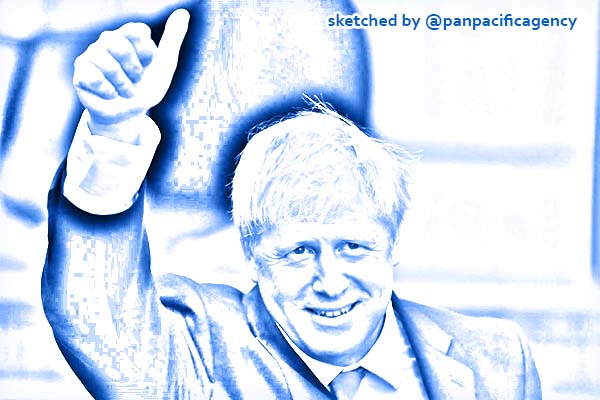British PM Johnson says hopes for better relations with Russia

LONDON, ENGLAND - JULY 23: Newly elected leader of the Conservative party Boris Johnson gestures at Conservative party HQ in Westminster on July 23, 2019 in London, England. After a month of hustings, campaigning and televised debates the members of the UK's Conservative and Unionist Party have voted for Boris Johnson to be their new leader and the country's next Prime Minister, replacing Theresa May. (Photo by Jeff J Mitchell/Getty Images). Sketched by the Pan Pacific Agency.
TALLINN, Dec 22, 2019, TASS. British Prime Minister Boris Johnson hopes for better relations with Russia, he said in an interview with Estonia’s ERR News on Saturday, TASS reported.
“I am like many people in western Europe who always hope that we can have better relations with Russia. Always we hope,” Johnson said.
“We want to have better commercial relations, we want to have more trade, but it is always so disappointing because we have terrible problems,” he added recalling the Salisbury incident with Sergei and Yulia Skripal and “the terrible difficulties that raises in our relations with Russia.”
On Saturday, Johnson arrived in the Estonian capital of Tallinn to assure his Estonian counterpart Juri Ratas of the unreserved support to the republic’s security. Apart from the meeting with Ratas, Johnson visited British troops at the Tapa military base outside Tallinn. The 850 British soldiers from the Queen’s Royal Hussars are stationed at the base to head the NATO battle group in Estonia, alongside with troops from Estonia, France and Denmark.
Skripal saga
According to London, former Russian military intelligence (GRU) Colonel Sergei Skripal, who had been convicted in Russia of spying for Great Britain and later swapped for Russian intelligence officers, and his daughter Yulia suffered the effects of an alleged nerve agent in the British city of Salisbury on March 4. Claiming that the substance used in the attack had been a Novichok-class nerve agent developed in the Soviet Union, London rushed to accuse Russia of being involved in the incident. Moscow rejected all of the United Kingdom’s accusations, saying that a program aimed at developing such a substance had existed neither in the Soviet Union nor in Russia.
Nevertheless, some countries, including the UK and the United States, ordered the expulsions of Russian diplomats. Moscow responded in kind.